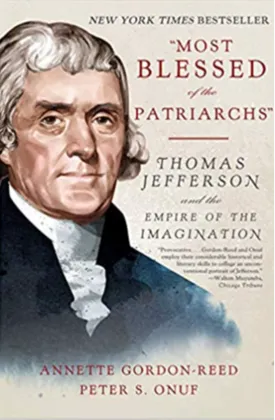Peter S. Onuf
Peter S. Onuf is an American author, historian, and professor of American Studies at the University of Virginia. He is also Thomas Jefferson Foundation Professor Emeritus and Senior Research Fellow at the Robert H. Smith International Center for Jefferson Studies. Since his early career, Onuf has devoted much of his research and writing to the American Revolution and its legacies, including the rise of national culture, the writing of the United States Constitution, and the expansion of federal authority. He is particularly known for his theory of the Revolution's “republican synthesis,” which states that the Founders’ conception of civic humanism challenged the European Old Regime systems of governance.
Onuf began his career as a professor of history at Lehigh University in 1975 before moving to the University of Virginia for a professorship in 1986. Soon after, he began a lengthy teaching career there, during which he was appointed the first Thomas Jefferson Foundation Professorship in 1993. In this capacity, he served as the chief interpreter of Thomas Jefferson’s legacy to the public. He also equipped students in the field of early American history with a deeper understanding of important topics related to Jefferson’s life and works.
Peter S. Onuf is the author of numerous books, articles, edited volumes, and reviews on American history, culture, and political thought. His books focus on a variety of American topics such as the intellectual legacies of Thomas Jefferson and Benedict Arnold, nationhood after the American Revolution, and the evolution of political parties from 1789 to 1815. He has also served as editor-in-chief of several volumes examinations of rights, representation, and economics in early America, focusing on the discourse between political leaders and everyday citizens during the Revolution and its aftermath.
Onuf’s most recent works focus mainly on the nation's early formation and the trajectories it established for the subsequent years. In his book The Mind of Thomas Jefferson (2019), Onuf discusses the political and cultural foundations of the early American Republic, as well as its legacy in contemporary anxieties. Onuf argues that although Thomas Jefferson was a powerful advocate of personal liberties, he also grappled with the implications that accompany freedom and equality and the difficulty of balancing both. He thereby sheds light on the violent, dynamic, and competing visions that led to the formation of the American nation.
Equally popular is Onuf’s The Origins of the American Republic (2011), which seeks to explain the key components of the nation’s early formulation. The book analyzes the Founding Fathers’ ideas concerning fear and ambition, tools of government, and the spectrum of cultural and ideological influences that informed the attempt at nation formation. Onuf further looks at the particular ways in which politics had to become part of the public life of the citizens.
Onuf has been formally recognized for his accomplishments as a historian and teacher. He has received numerous awards and honors from the Guggenheim Foundation, the National Endowment for the Humanities, and the American Academy of Arts and Sciences. Additionally, he has been awarded honorary doctorates from the University of Virginia and the University of St. Andrews.
Peter S. Onuf is a renowned American historian and teacher whose works have greatly advanced our historical understanding of the nation's founding. His books have explored the complex political and cultural debates, interpersonal relationships, and ideological battles that shaped the early United States, offering a radical reinterpretation of America’s republican synthesis. Onuf’s works, then, not only provide valuable insights into America’s earliest days but also, through Onuf’s perspective, to help us better understand our ongoing struggles over the fundamentals of freedom and equality.

